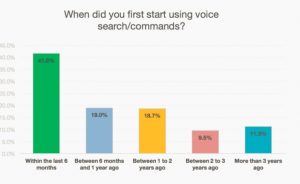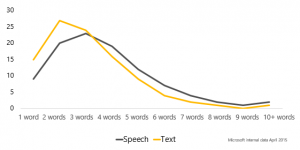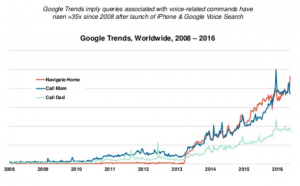During Google I/O 2016, Google’s annual news conference, the search engine unveiled some of its future plans by giving the world a quick look into it’s upcoming tools and platforms. One of these soon to be released tools is the new ‘Google Assistant’ which comes offered as an innovative (and talkative) new digital assistant for our daily schedules. The creation of Assistant follows Google’s research and analysis of the growing trend in voice search indicating that more and more people are adopting the technology into their everyday use of Google’s applications.
What is Google Assistant and what will it do?
Google Assistant is a voice based search or help tool, similar to Siri on an iPhone or Microsoft’s Cortana. However, during a demonstration Sundar Pichai, Google’s current CEO, highlighted the tool’s depth and how it offers an experience closer to having a human conversation than chatting to a smart robot. Google Assistant as shown in Pichai’s demonstration appears more conversational than standard search tools and draws more towards an AI experience with it’s ability to better understand people’s speech and the context it’s used in. To give you an insight into its capabilities, “what other movies has she directed?” is not a question you could ask other search tools such as Siri or Google Now, as they’d require a more direct question like; “what other movies has Jodie Foster directed?”, Google Assistant on the other hand would better understand the context and would know who “she” refers to, allowing it to provide the answer you seek without having to clarify details. To sum it up, Google’s Blog explains Assistant as:
“…conversational – an ongoing two-way dialogue between you and Google that understands your world and helps you get things done. It makes it easy to buy movie tickets while on the go, to find that perfect restaurant for your family to grab a quick bite before the movie starts, and then help you navigate to the theater”
Will I use it?
Well, according to the data below, you may’ve already used a search tool like Assistant. Given the prevalence of Google’s current voice search offerings, identified by the ubiquitous microphone icon, along with alternatives like Siri and Cortana, voice search has already been integrated into many of the most frequently used applications on a mobile device like YouTube, Google Maps and of course, Google Search. A common complaint with voice search is that you need to be very direct with your question, which often takes more time that just simply typing it yourself. Assistant on the other hand should be able to find what you’re after quicker by acknowledging more colloquial speech and indexing on contextual reference as detailed above. If we take a look at the statistics that have come through over the last couple of years it’s people that haven’t adopted voice search yet that will be surprised. *pause for dramatic effect*:

Study on Smartphone users in the US, 2015. Image: Mindmeld

Image: Microsoft internal data April 2015

Image: 2016 Internet Trends Report from Kleiner Perkins Caufield & Byers
The data presented through Search Engine studies has shown a growing trend in all types of voice queries. People are choosing to use natural, more colloquial language with even a handful of search queries becoming increasingly longer, much like a conversation. It appears with this information Google has tapped into what it believes is the new platform and benchmark of voice search capabilities.
Is Google Assistant the future of search?
From an SEO and PPC marketing perspective, voice search signifies a new way of thinking when it comes to reaching users online. These challenges and opportunities are yet to be clearly defined, but needless to say this is an exciting new chapter for our industry.
Where will I find Google Assistant?
During the same conference, Google also announced the future release of other software and tools which will integrate with Assistant. This indicates Assistant will be a key focus for future developments further cementing its place as the possible future of user experience. Just because the statistics present a growing acceptance to voice search doesn’t necessarily mean that you will use it now. It does however tailor to our demand for easier modes of interacting with technology and given the ever-decreasing attention span and ever-increasing need for instant gratification, the mass adoption of voice search seems very likely.
To add a Big Brother vibe to the conversation, it also proves that while people continue to create trends with search behaviour, Google will be studying our online habits and will actively search for more ways to accommodate our lifestyles with innovative platforms.
Perhaps Assistant is just the assistance we need?
As the data shows, voice search is becoming increasingly popular and Assistant will only add to this growing trend. With Google’s overarching goal to always better the user experience, it seems it’s found what we need next.
